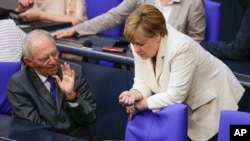Tuesday is another awkward day for Britain as Prime Minister David Cameron traveled to what is now hostile territory in Brussels to meet with EU leaders for the first time since the Brexit vote, and face tough questions on how and when Britain plans to start the divorce process.
“I want the U.K. to clarify its position. Not today, not tomorrow at 9 a.m., but soon," said EU Commission President Jean-Claude Juncker at an EU parliament emergency session Tuesday, the first on record.
Meanwhile, fallout from Brexit plunged Britain into deeper political turmoil Tuesday as Labour Party parliament members delivered a no-confidence vote to opposition leader Jeremy Corbyn, accusing him of leading a lackluster fight against the movement to leave the European Union. But Corbyn says despite the vote he won't step down.
That sets up a power struggle in both parties as Britain is faced with tough decisions on how to leave the EU.
Hours after the Brexit decision was announced last Friday, Cameron announced he will resign.
British leaders appear to be in no hurry to start the departure process. Outgoing Prime Minister David Cameron has made it clear it will be his successor, not he, who will initiate the disengagement by invoking Article 50 of the Lisbon treaty on a negotiated departure.
Cameron’s Conservative party plans to start the process of nominating its next leader on Thursday and expects to name a successor by September 2.
That is not fast enough for France and other EU members who fear the longer Britain waits, the more economic damage could occur, as markets Tuesday began another turbulent day. “We cannot allow ourselves to remain in a prolonged period of uncertainty,” Juncker said.
Only a day after U.S. Secretary of State John Kerry called for leaders to keep calm and “not lose their head,” anger boiled over in Brussels, where British European Parliament member Nigel Farage, a leader of the Brexit movement and anti-immigrant crusader, incensed his EU colleagues while arguing for a tariff-free deal.
“Virtually none of you have ever done a proper job in your lives, or worked in business, or worked in trade, or indeed ever created a job, but listen. Just listen,” Farage said as his voice was nearly drowned out by boos and jeers.
Those who pushed to leave appear to be in no hurry to start the departure process, raising questions from critics on whether they had a plan.
Until now, leaders of the Leave movement have not made a plan public, but observers said their strategy is apparent: wait until the dust settles.
In delivering a statement Monday, former London Mayor Boris Johnson, the usually boisterous leader of the Leave movement and widely considered a likely successor to Cameron, appeared uncharacteristically calm and low-key, his tone conciliatory and calming.
“To those who may be anxious, whether at home or abroad, this does not mean that the United Kingdom will be in any way less united, nor indeed does it mean that it will be any less European,” he said.
Johnson wants Britain to retain access to the single market much like Norway, a non-EU member, has. EU leaders on Tuesday made it clear they will not favor such an arrangement or any negotiations, formal or informal, before Britain invokes Article 50 and starts the departure process.
German Chancellor Angela Merkel warned Britain against cherry picking. “If you want to exit and leave this family, then you cannot expect to drop obligations and have privileges continue.”






